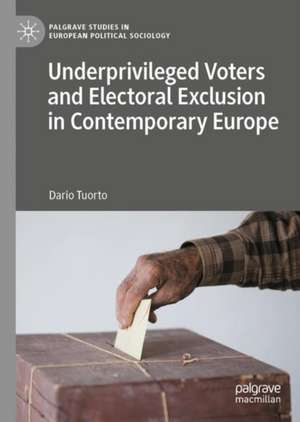Underprivileged Voters and Electoral Exclusion in Contemporary Europe: Palgrave Studies in European Political Sociology
Autor Dario Tuortoen Limba Engleză Hardback – 24 mai 2022
Din seria Palgrave Studies in European Political Sociology
-
 Preț: 399.63 lei
Preț: 399.63 lei - 15%
 Preț: 643.48 lei
Preț: 643.48 lei - 18%
 Preț: 1005.43 lei
Preț: 1005.43 lei -
 Preț: 392.75 lei
Preț: 392.75 lei - 15%
 Preț: 583.13 lei
Preț: 583.13 lei - 15%
 Preț: 696.96 lei
Preț: 696.96 lei - 15%
 Preț: 503.52 lei
Preț: 503.52 lei -
 Preț: 385.47 lei
Preț: 385.47 lei - 18%
 Preț: 784.48 lei
Preț: 784.48 lei - 18%
 Preț: 1003.38 lei
Preț: 1003.38 lei -
 Preț: 419.86 lei
Preț: 419.86 lei - 18%
 Preț: 738.52 lei
Preț: 738.52 lei -
 Preț: 381.21 lei
Preț: 381.21 lei - 18%
 Preț: 953.97 lei
Preț: 953.97 lei - 18%
 Preț: 725.39 lei
Preț: 725.39 lei - 15%
 Preț: 646.94 lei
Preț: 646.94 lei - 15%
 Preț: 584.92 lei
Preț: 584.92 lei -
 Preț: 227.81 lei
Preț: 227.81 lei - 15%
 Preț: 585.40 lei
Preț: 585.40 lei - 15%
 Preț: 469.22 lei
Preț: 469.22 lei - 15%
 Preț: 586.23 lei
Preț: 586.23 lei - 18%
 Preț: 781.94 lei
Preț: 781.94 lei - 15%
 Preț: 525.85 lei
Preț: 525.85 lei - 15%
 Preț: 696.35 lei
Preț: 696.35 lei - 15%
 Preț: 698.62 lei
Preț: 698.62 lei - 15%
 Preț: 698.15 lei
Preț: 698.15 lei - 18%
 Preț: 791.40 lei
Preț: 791.40 lei - 15%
 Preț: 472.51 lei
Preț: 472.51 lei -
 Preț: 384.31 lei
Preț: 384.31 lei -
 Preț: 389.70 lei
Preț: 389.70 lei - 15%
 Preț: 695.48 lei
Preț: 695.48 lei -
 Preț: 426.34 lei
Preț: 426.34 lei - 15%
 Preț: 704.87 lei
Preț: 704.87 lei -
 Preț: 390.84 lei
Preț: 390.84 lei - 18%
 Preț: 729.53 lei
Preț: 729.53 lei -
 Preț: 387.75 lei
Preț: 387.75 lei - 15%
 Preț: 702.54 lei
Preț: 702.54 lei - 15%
 Preț: 700.94 lei
Preț: 700.94 lei -
 Preț: 391.22 lei
Preț: 391.22 lei
Preț: 386.81 lei
Nou
Puncte Express: 580
Preț estimativ în valută:
74.02€ • 80.38$ • 62.18£
74.02€ • 80.38$ • 62.18£
Carte tipărită la comandă
Livrare economică 23 aprilie-07 mai
Preluare comenzi: 021 569.72.76
Specificații
ISBN-13: 9783030975043
ISBN-10: 3030975045
Ilustrații: XIV, 178 p. 16 illus., 9 illus. in color.
Dimensiuni: 148 x 210 mm
Greutate: 0.39 kg
Ediția:1st ed. 2022
Editura: Springer International Publishing
Colecția Palgrave Macmillan
Seria Palgrave Studies in European Political Sociology
Locul publicării:Cham, Switzerland
ISBN-10: 3030975045
Ilustrații: XIV, 178 p. 16 illus., 9 illus. in color.
Dimensiuni: 148 x 210 mm
Greutate: 0.39 kg
Ediția:1st ed. 2022
Editura: Springer International Publishing
Colecția Palgrave Macmillan
Seria Palgrave Studies in European Political Sociology
Locul publicării:Cham, Switzerland
Cuprins
Chapter 1. Introduction.- Chapter 2. Voter turnout and imperfect inclusivity: a democratic problem.- Chapter 3. Turnout and socio-economic inequality at the individual level.- Chapter 4. The institutional determinants of turnout inequalities.- Chapter 5. Voting in times of crisis. From opting out to regaining a voice
Notă biografică
Dario Tuorto is Associate Professor in Sociology at the Department of Education, University of Bologna, Italy. His main research interests are social and political inequalities, populism, party activism, electoral and political participation, with a focus on age and gender differences. He is a member of Italian National Election Studies. He published two books on turnout and several articles in international journals such as Party Politics, Political Geography, Social Politics, Contemporary Italian Politics. He is one of the founders of the Institute Cattaneo-Prospex archive on turnout (based on a large sample of 100 sections of Italian voters).
Textul de pe ultima copertă
“Inequality in people’s vote participation boosts the challenges to democracy originating from trends of falling turnout. Tuorto’s engaging book offers a thoroughly theoretical and empirical exploration of the causes and consequences of falling turnout among unprivileged segments of society, whose abandonment of the polling booth has widened with the inception of the Great Recession. A must-read for the political behaviour community and for all concerned about the prospects of representative democracy.”
– Professor Paolo Bellucci, University of Siena, Italy
This volume investigates the reasons behind contemporary participatory inequality, the form and dimensions it assumes in relation to the institutional constraints that regulate access to the electoral arena and socio-cultural transformations which have altered both the class structures and the territorial basis of voting. At the same time, it analyses the effects that the intensification of these processesrisk to produce, if uncontrolled, on the stability of the democratic system and on the individual life of voters, deprived of institutional representation and left with the alternatives of protest (channelled by existing parties or elements outside the party system) or detachment from politics.
Dario Tuorto is Associate Professor in Sociology at the Department of Education, University of Bologna, Italy.
– Professor Paolo Bellucci, University of Siena, Italy
This volume investigates the reasons behind contemporary participatory inequality, the form and dimensions it assumes in relation to the institutional constraints that regulate access to the electoral arena and socio-cultural transformations which have altered both the class structures and the territorial basis of voting. At the same time, it analyses the effects that the intensification of these processesrisk to produce, if uncontrolled, on the stability of the democratic system and on the individual life of voters, deprived of institutional representation and left with the alternatives of protest (channelled by existing parties or elements outside the party system) or detachment from politics.
Dario Tuorto is Associate Professor in Sociology at the Department of Education, University of Bologna, Italy.
Caracteristici
Examines the relationship between socio-economic and political exclusion Confronts the many expressions that inequality assumes today Questions whether disadvantage at individual level is connected with that at territorial level
